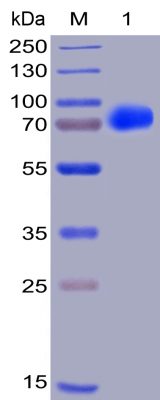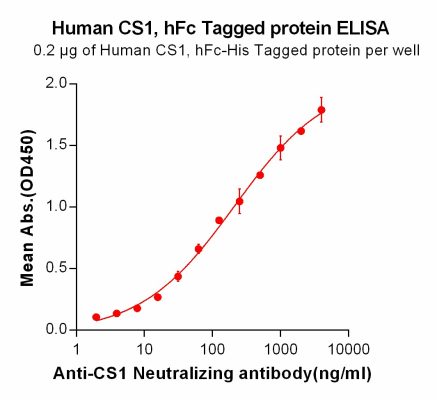| TARGET | |
|---|---|
| SYNONYMS |
SLAMF7;CD319;CS1;CRACC;19A;FOAP-12 |
| DESCRIPTION |
Recombinant human CS1 protein with C-terminal human Fc and 6×His tag |
| DELIVERY |
In Stock |
| UNIPROT ID |
Q9NQ25 |
| EXPRESSION HOST |
HEK293 |
| TAG |
C-Human Fc and 6×His Tag |
| MOLECULAR CHARACTERIZATION |
CS1(Ser23-Met226) hFc(Glu99-Ala330) 6×His tag |
| MOLECULAR WEIGHT |
The protein has a predicted molecular mass of 70 kDa after removal of the signal peptide. |
| PURITY |
The purity of the protein is greater than 95% as determined by SDS-PAGE and Coomassie blue staining. |
| FORMULATION & RECONSTITUTION |
Lyophilized from sterile PBS, pH 7.4. Normally 5 % – 8% trehalose is added as protectants before lyophilization. Please see Certificate of Analysis for specific instructions of reconstitution. |
| STORAGE & SHIPPING |
Store at -20°C to -80°C for 12 months in lyophilized form. After reconstitution, if not intended for use within a month, aliquot and store at -80°C (Avoid repeated freezing and thawing). Lyophilized proteins are shipped at ambient temperature. |
| BACKGROUND |
SLAM family member 7 (SLAMF7) is also known as CD2-like receptor-activating cytotoxic cells (CRACC), Membrane protein FOAP-12, CD antigen CD319, Novel Ly9, Protein 19A, which is a single-pass type I membrane protein and a member of the CD2 family of cell surface receptors. SLAMF7 is expressed in spleen, lymph node, peripheral blood leukocytes, bone marrow, small intestine, stomach, appendix, lung and trachea. Isoform 1 of SLAMF7 mediates NK cell activation through a SH2D1A-independent extracellular signal-regulated ERK-mediated pathway. May play a role in lymphocyte adhesion. Isoform 3 of SLAMF7 does not mediate any NK cell activation. |
| USAGE |
Research use only |
1
/
의
1
Dima Biotech
SKU(재고 관리 코드):PME100002
Human CS1 Protein, hFc-His Tag
Human CS1 Protein, hFc-His Tag
PRODUCT DATA
IMAGES

Figure 1. Human CS1, hFc-His Tag on SDS-PAGE under reducing condition.

Figure 2. ELISA plate pre-coated by 2 μg/ml (100 μl/well) Human CS1, hFc-His tagged protein (PME100002) can bind Anti-CS1 Neutralizing antibody (BME100002) in a linear range of 7.81-210.7 ng/ml.


